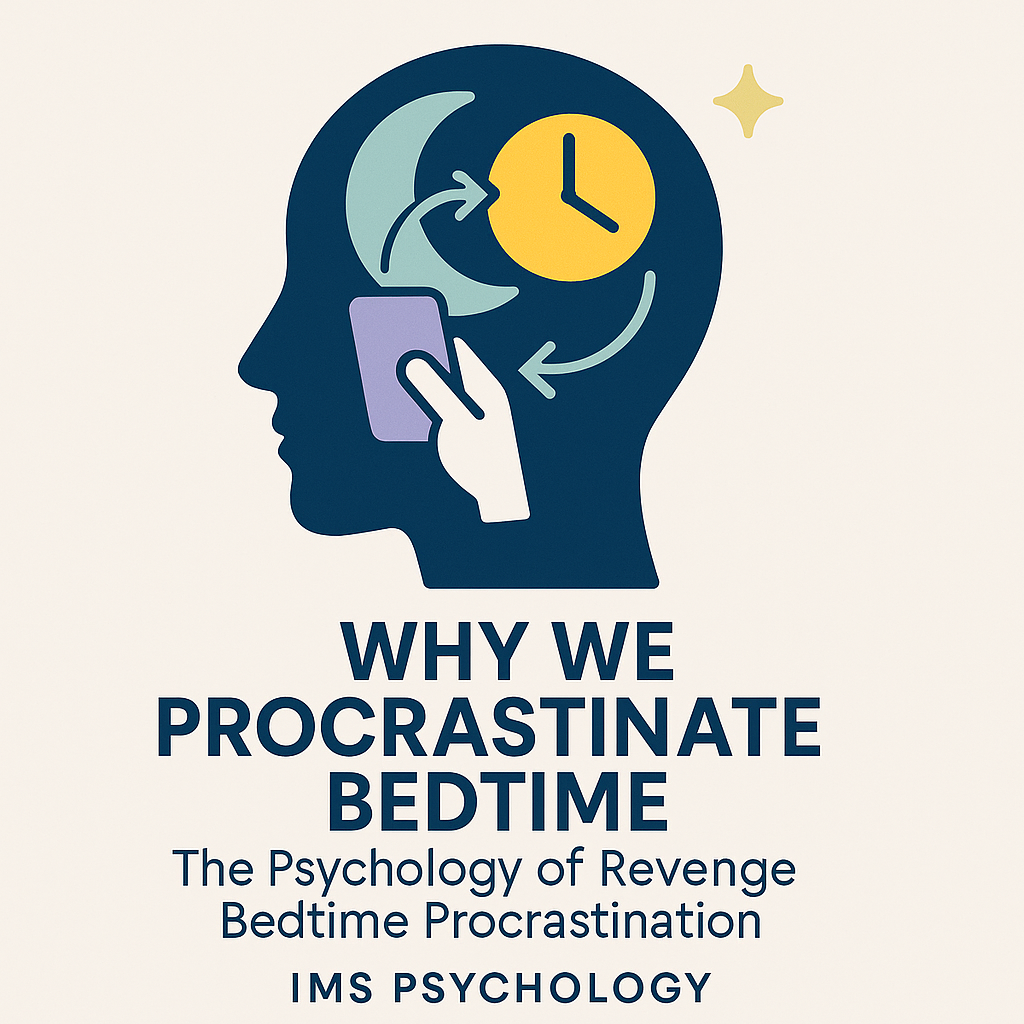
Why We Procrastinate Bedtime: The Psychology of Revenge Bedtime Procrastination
Share
Why We Procrastinate Bedtime: The Psychology of Revenge Bedtime Procrastination
Revenge bedtime procrastination is the habit of delaying sleep to reclaim free time. Learn why it happens, its mental health costs, and how psychology offers solutions.
Introduction: When Rest Turns Into Resistance
It’s midnight. You’re exhausted, yet you keep scrolling, binge-watching, or doing “just one more thing.” This isn’t just poor time management — it’s a growing psychological phenomenon called revenge bedtime procrastination.
People sacrifice sleep not because they don’t value it, but because they feel their day offered too little personal time. Staying up late becomes an act of quiet rebellion — “I’ll rest later, but right now, this time is mine.”
What Is Revenge Bedtime Procrastination?
The term originated in China as “revenge against the day” — a way for overworked individuals to reclaim control over their schedules.
In psychology, bedtime procrastination refers to:
-
Delaying sleep without external reasons (no urgent deadlines).
-
Recognizing it’s harmful but doing it anyway.
-
Feeling a need for autonomy and leisure that wasn’t met during the day.
The Psychology Behind Bedtime Procrastination
Why would anyone knowingly sabotage sleep? Several psychological mechanisms explain it:
1. Autonomy and Control
According to Self-Determination Theory, humans crave autonomy. When daily life feels dictated by work, school, or caregiving, late-night hours may feel like the only time to choose freely.
2. Emotional Compensation
Psychologists call this “mood repair” — using leisure activities (scrolling, gaming, watching shows) to balance stress and frustration.
3. Present Bias
Behavioral economics shows we prioritize short-term rewards (pleasure now) over long-term benefits (rest tomorrow).
4. Ego Depletion
After a day of self-control (deadlines, responsibilities), willpower is drained, making it harder to resist late-night indulgence.
5. Technology Traps
Apps, notifications, and endless scroll designs exploit reward circuits in the brain, making “just 10 more minutes” turn into hours.
The Mental and Physical Costs
While revenge bedtime procrastination offers temporary relief, chronic sleep loss has real consequences:
-
Cognitive Impairment: Reduced focus, memory, and problem-solving.
-
Emotional Instability: Heightened anxiety, irritability, and stress.
-
Physical Health Risks: Weakened immune system, weight gain, cardiovascular issues.
-
Mental Health: Sleep deprivation worsens depression and burnout.
Ironically, sacrificing rest for “me-time” often makes the next day even harder — perpetuating the cycle.
Signs You May Be Procrastinating Sleep
-
You delay sleep without external obligations.
-
You tell yourself “just one more episode/scroll.”
-
You feel guilty but repeat it often.
-
You crave freedom after structured or stressful days.
How to Break Free: Psychology-Based Strategies
1. Redefine “Me-Time”
Shift leisure into the day where possible. Even 15 minutes of mindful breaks can reduce the urge to reclaim hours at night.
2. Create a Wind-Down Ritual
-
Dim lights, stretch, read a book.
-
Signal to your brain that it’s safe to relax.
3. Use Implementation Intentions
Form “if-then” plans:
-
“If it’s 11 p.m., then I will plug in my phone outside my bedroom.”
4. Practice Self-Compassion
Blaming yourself fuels the cycle. Instead, reframe: “I’m craving freedom. How can I meet that need earlier?”
5. Limit Tech Triggers
-
Set app timers.
-
Keep screens out of the bedroom.
-
Replace doomscrolling with calming activities.
6. Focus on Values
ACT (Acceptance & Commitment Therapy) emphasizes aligning actions with values. Ask: “Does this choice serve my health and tomorrow’s goals?”
When to Seek Support
If bedtime procrastination significantly affects mood, focus, or health, therapy can help. CBT for insomnia (CBT-I) is an evidence-based treatment that combines sleep science with thought and behavior shifts.
Practical Tools You Can Use Today
IMS Psychology offers downloadable, evidence-based workbooks that address procrastination, stress, and emotional regulation. Our [Sleep & Self-Care Workbook] includes routines, CBT strategies, and self-reflection tools to break cycles of late-night avoidance.
Conclusion: From Revenge to Rest
Revenge bedtime procrastination isn’t laziness — it’s a sign of unmet needs for freedom, rest, and balance. While staying up late may feel like reclaiming control, it often leaves us more depleted.
By understanding the psychology behind this habit and applying science-backed strategies, you can protect both your sleep and your sense of autonomy.
If you’d like structured exercises to reclaim balance, explore the IMS Psychology workbooks, designed to turn research into practical tools for daily life.
written by,
Martin Rekowski (04.10.2025)
Internal Suggestion
Sleep & Self-Care Workbooks (or similar products in our shop).